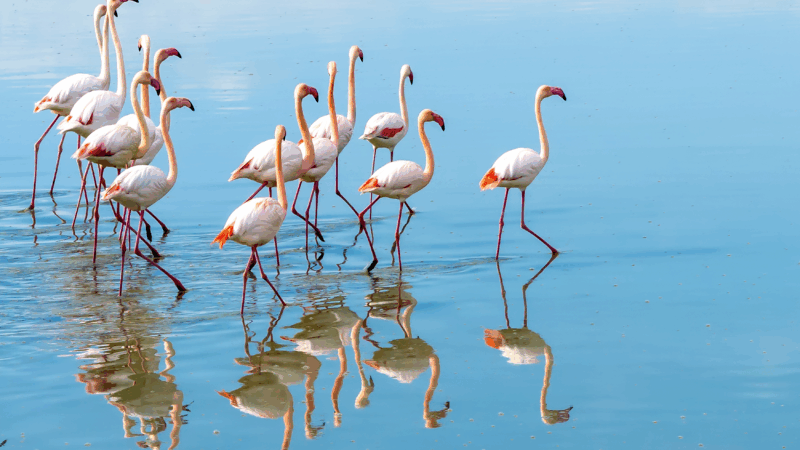Scientists have figured out why flamingos are such weird eaters
Flamingos look graceful, but when it’s time to eat, they’re very silly.
“All of their feeding behavior is so weird,” says Steven Whitfield, the director of terrestrial and wetlands conservation at the Audubon Nature Institute in New Orleans, La.
The lanky birds feed on shrimp and algae in briny swamps and marshes around the world. To grab a bite, they stick their heads underwater and open and close their bill rapidly, as if chattering. Then they stomp their feet and wobble around in the mud, bobbing their heads up and down as they go.
It’s not immediately apparent why the iconic pink birds would take this absurd approach to getting a meal. They are filter feeders, “so they’re kind of like the bird version of an oyster,” Whitfield says. They strain water through their L-shaped beaks, trapping shrimp, algae, seeds and anything else they find tasty.
But with their heads practically between their legs, their bills appear to be upside down and facing the wrong way to scoop up the shrimp and algae in front of them.
“Flamingos are doing everything wrong, it seems like,” says Saad Bhamla, a biophysicist at Georgia Tech University who studies how animals use physics to solve problems. Bhamla’s then-student, Victor Ortega-Jiménez, first noticed the odd feeding behavior during a day out for the laboratory at the Atlanta Zoo a few years back. Ortega-Jiménez wanted to find out what was going on.
“All we need is a hook, an observation, and it’s off to the races,” Bhamla says.
Of course, flamingos know perfectly well what they’re doing, and now so does Bhamla’s group. Writing in this week’s issue of the journal Proceedings of the National Academy of Sciences, the team reveals that the entire flamingo feeding process is actually a tour de force in fluid dynamics.
The bird is creating vortices in the water with almost every move. Take, for example, the bobbing of its head. The shape of its bill creates a tiny tornado as it pulls out of the water. The swirling stirs up prey and traps it long enough for the bird to duck back in and scoop it up. Same goes for the chattering, which pulls food up toward its beak.
Then there’s the strange stomping of their feet. The study finds that flamingos’ webbed toes create a pair of vortices that push food toward their bills. That’s why it makes sense to have the head facing the feet instead of whatever is in front of them.
“What they’re basically doing is playing with fluid dynamics — using the beak, using their legs, using their heads and necks,” Bhamla says.
Ultimately, Bhamla says, flamingos may have some more to teach humans. He works with chemists who, among other things, want to learn how to better filter water through membranes. Those membranes frequently clog up with debris similar in size to what the flamingos filter for their food. So it seems possible that some of the vortex-inducing techniques of flamingos could be adapted to help keep the filters clear.
Now, “we’re basically using flamingo-inspired clever tricks” to try and come up with solutions, he says.
Whitfield, who was not affiliated with the work, says that it shows the great thing about science — there are always mysteries waiting to be solved.
“And with birds as bizarre as flamingos,” he adds, “there’s probably more than average.”
U.S. unexpectedly adds 130,000 jobs in January after a weak 2025
U.S. employers added 130,000 jobs in January as the unemployment rate dipped to 4.3% from 4.4% in December. Annual revisions show that job growth last year was far weaker than initially reported.
Greetings from Mexico City’s iconic boulevard, where a dog on a bike steals the show
Every week, more than 100,000 people ride bikes, skates and rollerblades past some of the best-known parts of Mexico's capital. And sometimes their dogs join them too.
February may be short on days — but it boasts a long list of new books
The shortest month of the year is packed with highly anticipated new releases, including books from Michael Pollan, Tayari Jones and the late Nobel laureate Mario Vargas Llosa.
Shootings at school and home in British Columbia, Canada, leave 10 dead
A shooting at a school in British Columbia left seven people dead, while two more were found dead at a nearby home, authorities said. A woman who police believe to be the shooter also was killed.
Trump’s EPA plans to end a key climate pollution regulation
The Environmental Protection Agency is eliminating a Clean Air Act finding from 2009 that is the basis for much of the federal government's actions to rein in climate change.
The U.S. claims China is conducting secret nuclear tests. Here’s what that means
The allegations were leveled by U.S. officials late last week. Arms control experts worry that norms against nuclear testing are unraveling.







